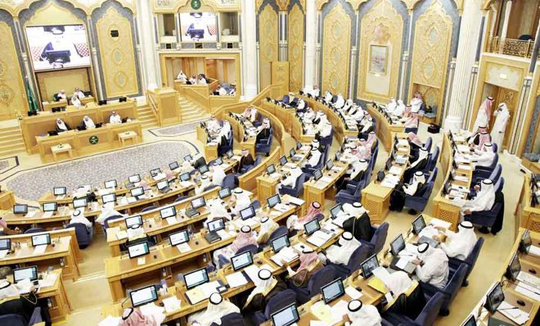Riyadh, Nov 9: The Shoura Council has called on the Ministry of Environment, Water and Agriculture to conduct a field study to determine citizens’ real consumption of water, accordingly adjust consumption segments, and delay issuing new water bills until handling complaints about the new tariffs.

This came in the 62nd regular session held on Tuesday under the chairmanship of Deputy Speaker of the Shoura Council Dr. Mohammed bin Amin Al-Jafri.
Assistant Speaker of the Council Dr. Yahya bin Abdullah Al-Samaan said in a statement after the session that the council took this decision after reviewing a report issued by the Committee of Environment, Water and Agriculture concerning council member comments on the annual performance report of the Ministry of Water and Electricity.
The Council also called on the Ministry of Environment, Water and Agriculture to take rationing measures to reduce the high annual consumption of water, and to qualify private companies and institutions to discover leaks in water networks inside homes.
The council also demanded that the Ministry of Environment, Water and Agriculture speed up of implementation of Saudi Building Code in terms of water consumption.
In another decision, the Shoura Council demanded that the Saudi Exports Development Authority (SEDA) encourage the establishment of sectoral associations for exporters that would contribute to the development of multi-export sectors. The council called on SEDA to implement the single-window system to facilitate export procedures.
In addition, the council discussed a report issued by the special committee on the draft bill of the public money protection system, which consists of 26 articles that aim to protect public money.
The council also approved the draft resolution of the cooperation agreement in maritime transportation between the Saudi and Algerian governments, which was signed in Riyadh on Dec. 9, 2015.
Separately, Shoura Council delegation headed by Dr. Khalid bin Abdullah Al-Sabti met Monday with the chairman of the Foreign Affairs Committee of the German Parliament, Dr. Norbert Roettgen at the German Parliament in Berlin.
The meeting marked the beginning of an official visit to Germany by the Saudi delegation, which included Dr. Faleh Al-Sagheer, Dr. Fayez Al-Shahri and Dr. Thuraya Al-Areed. Also taking part in the meeting was Saudi Ambassador to Germany Dr. Awad Al-Awad.
Dr. Sabti highlighted the efforts of the Kingdom, led by the Custodian of the Two Holy Mosques King Salman, to bring about peace in the region.
He also underlined Saudi Arabia’s effort to ease the suffering that is caused by the ongoing crises in the Middle East, and said the Kingdom is exerting all efforts to combat terrorism and extremist ideology.
The meeting discussed other issues of mutual concern and ways to boost cooperation.
Deputy Chairman of the Defense Committee of the German Parliament Dr. Karl Lamers stressed the importance of visits between the two sides.





Comments
Add new comment